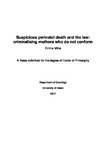Suspicious perinatal death and the law: criminalising mothers who do not conform
| dc.contributor.author | Milne, E | en |
| dc.date.accessioned | 2019-10-02T15:22:35Z | |
| dc.date.available | 2019-10-02T15:22:35Z | |
| dc.date.issued | 2017-09-18 | en |
| dc.identifier.uri | http://hdl.handle.net/10026.1/14957 | |
| dc.description.abstract |
How should the criminal justice system respond to women who conceal their pregnancies, resulting in the death of the foetus or baby? It is widely expected that a pregnant woman will act in the best interests of her unborn child, including submitting herself to medical examination. However, these expectations are not always met and this causes particular problems for vulnerable women who experience crisis pregnancies. In such situations women have hidden their pregnancies, given birth in secret, and are suspected of causing the death of the baby. Alternatively, their actions while pregnant, and during labour and delivery are deemed to have culminated in the stillbirth of the child. While there are no accurate statistics, every year approximately 7 babies/foetuses are known to die in such circumstances during the perinatal period. Through a detailed examination of transcripts from sentencing hearings of criminal cases heard 2010-2014, I explore how and why women involved in such cases have come to be dealt with through English criminal law. There appears to be a strong desire to criminalise women who are perceived to fail to put the foetus first. Criminal justice professionals use out-dated offences to capture these perceived criminal wrongs. I conclude that if the state wishes to punish women for harm caused to the foetus, then the enactment of foetal protection laws would be appropriate. However, as critical assessment of such law in the United States of America illustrates, such laws could have dramatic consequences on the rights of women. The cases analysed in this thesis provide a fascinating lens through which to examine a range of broader issues including, the expectation that women should put the needs of the foetus before their own, and the assumption that motherhood starts at conception and is natural and inherent. | en |
| dc.language.iso | en | en |
| dc.title | Suspicious perinatal death and the law: criminalising mothers who do not conform | en |
| dc.type | Thesis | |
| plymouth.organisational-group | /Plymouth | |
| plymouth.organisational-group | /Plymouth/00 Groups by role | |
| plymouth.organisational-group | /Plymouth/00 Groups by role/Academics | |
| plymouth.organisational-group | /Plymouth/Faculty of Arts and Humanities | |
| plymouth.organisational-group | /Plymouth/Faculty of Arts and Humanities/School of Law, Criminology and Government | |
| plymouth.declined | 2019-10-02T16:22:35.173+0100 | |
| rioxxterms.licenseref.uri | http://www.rioxx.net/licenses/all-rights-reserved | en |
| rioxxterms.type | Thesis | en |


